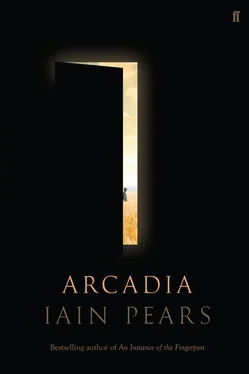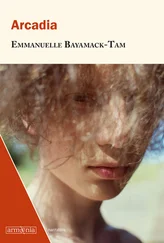‘In comparison to...?’
‘I’ve been reading a manuscript by a colleague of mine, Persimmon. He lays out what he thinks is the perfect technocratic society. Hell on earth.’
‘So?’
‘He is quite stupid, you know, but he has forecast the future remarkably well. The nightmare he conjures up is extraordinarily like the one you and Chang describe.’
Angela fell silent for a long time.
‘Now,’ she said eventually, ‘you’re just trying to give me a headache.’
It was the pigeons in the great entrance hall which convinced Angela that Henry was telling the truth when he said that his great-aunt’s house was semi-derelict. The ‘semi’ bit was the only part she disputed. His aunt Gertie matched the place perfectly as well, more a character out of a Gothick novel than somebody real. She was dressed in ragged velvet, carried a huge candelabrum about with her and smelled as though she had not had a bath for months. Her hair was thin and unkempt and her conversation bizarre.
Henry, though, was delighted to see her. He gave her a big hug and she examined Angela closely by thrusting the candlesticks into her face and squinting up at her. ‘A pretty one, eh?’ she cackled. ‘That makes a change. Are you here to fix the plumbing?’
‘No, Auntie. Just to collect a few papers,’ Henry bellowed into her ear.
‘They’ve stopped delivering. Say I don’t pay the bills.’
‘Manuscripts, darling. Not newspapers.’
‘You can read it over breakfast, like your uncle Joseph. Have you seen him?’
‘He died in 1928.’
‘Really?’
‘Yes. He drove his car off a cliff, remember?’
She shook her head. ‘Tell him to be more careful when you see him.’
‘I will. Now, you go and sit down and pour yourself a nice gin. I just want to go upstairs and collect this thing I’m after. Then, I’m afraid, we’ll have to run off. Angela and I are in a bit of a hurry.’
‘Angela?’
‘This is Angela.’
She peered again. ‘A pretty one, eh? That makes a change.’
‘Blimey,’ Angela said as she followed Henry to the door.
‘She’s very sweet, and I love her dearly, but my head starts to spin after half an hour with her.’
‘She’s right about Uncle Joseph, you know.’
‘Don’t you start.’
Henry left me to deal with his aunt and disappeared up the stairs to go to the family archive. It would, he said, only take a few minutes.
Oddly, I have always found the company of the ancient relaxing. What is condemned in this brutal age as dementia, senility and worse is, in fact, a substantial step forward which aligns the mind rather more accurately with reality than our normal state.
Aunt Gertie could not tell the difference between 1928 and now. Uncle Joseph was dead and alive. In other words, she grasped the essential non-existence of time. Generally speaking, our minds impose an entirely artificial order on the world. It is the only way that such an inadequate instrument as our brain can function. It cannot deal with the complexity of reality, so simplifies everything until it can, putting events into an artificial order so they can be dealt with one at a time, rather than all at once as they should be. Such a way of interpreting existence is learnt, rather in the way that our brain has to turn the images which hit our retinas upside down in order to make sense of them.
Children have little sense of time; nor do the very old. They live in an ever-present now, which stretches into the past and off into the future. Effect triggers cause, and both happen at the same moment, be that yesterday or tomorrow. Aunt Gertie sensed this because all the acquired mental discipline of the years was falling away from her. Once you realised this, her conversation was perfectly comprehensible, even if it did make me a little dizzy.
Alas, I didn’t have long enough for a proper talk; Henry was as good as his word. He returned dusty but triumphant.
‘Got it,’ he said. ‘Just where I thought it would be.’
It was a thin tome, bound in red morocco and calf skin, with no lettering, but I knew the moment I opened it that he had indeed found what I was looking for. Page after page, all in Tsou, meticulously written out by hand. I was astonished at the workmanship. Tsou is a very dense script; the slightest error and it is gibberish. Doing it by hand must have taken years. Despite myself, I felt a little surge of admiration for Lucien Grange, or sympathy for the desperation which pushed him to even contemplate such a task. He must have had a perfect copy in his head even to attempt the job. That answered the question of who had accessed the computer before I left.
I checked through as much as I could to make sure. All was well; it was a fine summary of my work, except for the last symbol, which seemed a little odd. That one I absorbed properly and decoded, and unravelled instructions in plain English. Crop yields and rentals, folios 27–8.
‘Henry?’ I said. ‘What does this mean?’
‘What it says, I imagine. In the archives there are shelves of accounts in chronological order according to the estate’s different sources of income.’
‘Can I look?’
‘I’ll go for you, if you like.’
‘No!’ I said. ‘You have a good chat with your aunt here.’
‘As you please. Second floor, third door on the right. I left it open. If you get to the servants’ staircase you’ve overshot. Do you want me to destroy this, by the way?’
‘Not yet. I’d better find out what this reference means first of all. It can wait for a bit.’
So I went, leaving the Devil’s Handwriting with Henry, who stowed it carefully in his jacket pocket. Another coincidence, you see. I could easily have taken it with me, or had him set light to it in the fireplace.
‘To whom it may concern,’ began the piece of paper, which I found after only ten minutes of searching. One thing about these aristocrats, they were always very tidy when it came to money.
‘I very much hope that one day someone capable of understanding this letter finds and reads it. My name is Charles Lytten, although I took his identity many decades ago when I arrived in this place. Before that I was called Lucien Grange, and I was an administrator, first class, in the research institute of Zoffany Oldmanter. Unless this means something to you, you might as well stop reading now.’
On it went in a somewhat self-pitying fashion. Grange had written down the code in the hope that someone might find it and get him back, although quite how he expected this considering that he clearly believed he was in a parallel universe was unclear. I suppose he was desperate, and willing to clutch at straws. As I read I could understand why. He had made a decent fist of living in the eighteenth century, and had adapted well, but was worried nonetheless.
‘My concern is that the colonisation programme will wipe out the indigenous population with me still in place here. I beg anyone who reads and understands this to ensure I am recovered before any such attempt is made.’
That was the last piece I needed. A programme to clear out a world and make it available for colonists from my time. Of course that would appeal to a megalomaniac like Oldmanter. It was obvious how it would be done, as well. Oldmanter liked money; he would choose the quickest and cheapest option, and the further you went, the more power would be required. How to clear a world of its population quickly and efficiently? The evidence of Anterwold gave the answer.
This was where the next significant coincidence came in, the final proof, if you like. As I walked to the door I heard a noise through the window which looked out over the main driveway — once a fine avenue of trees, now more like a weed patch. Still, there were remains of old gravel covering it, and it was the crunching of this which made me look to see what was happening. A black car and a plain van were pulling up outside. From the car, I could see the unmistakeable figure of Sam Wind get out.
Читать дальше












